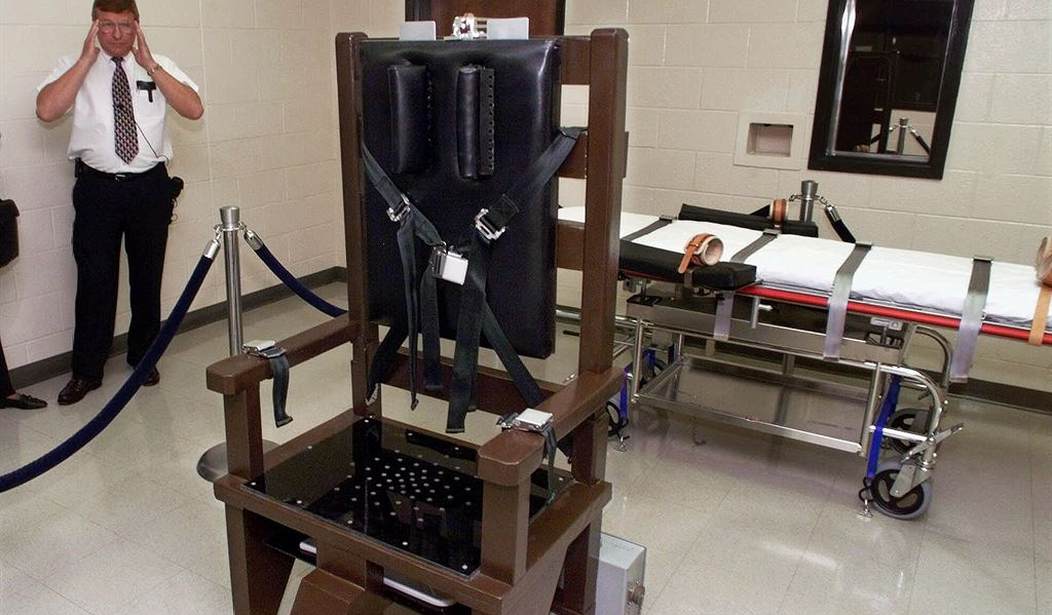Growing up in Texas during the '80s and '90s, capital punishment was a mundane part of life. Turn on the 5 o'clock news and, if there was a scheduled execution that evening, you'd hear about it just as plainly as you would a road closure or incoming low pressure system. Teenagers would giggle if the lights flickered, musing if someone was "riding the lightning." Even through the '90s and '00s, Texas's kids experienced similar sentiments. "I never gave it a second thought," says Nan Tolson, a 28-year old Lone Star native raised outside of Dallas. "We executed people that did horrible things and that was that - that was the punishment."
I won't speak for any other state, but the death penalty was as much a part of Texas culture as tacos and football. I say "was" because there is a quiet groundswell of support for abolishing execution, not just in Texas, but across the country. According to the Death Penalty Information Center, public support for the death penalty has been declining over the last 25 years and is now nearing record lows.
"One of the biggest myths about the death penalty is that it's an effective deterrent for crime, but there is no conclusive evidence for that. If we're worried about the crime aspect of keeping people safe, then the death penalty should not be a part of that equation because it doesn't," says Tolson, whose impressive political career has led her through the Office of the Texas Governor communications shop where she rose high enough in the ranks to achieve deputy press secretary. Currently, Tolson is the director of Texas Conservatives Concerned About the Death Penalty.
There is a microcosm where capital punishment is actually an incentive: prison. Last year I had lunch with Ron Wright, a man wrongfully convicted of first degree murder in 2013; he was exonerated in 2016 after the Florida Supreme Court overturned the conviction due to official misconduct and lack of evidence. Wright stated that life without parole is a more powerful sentence because execution means the prisoner has a finish line, an "out" of their punishment. Guards have to be even more vigilant around a prisoner sentenced to life without parole because killing an officer carries the death penalty, and dying is easier than living in prison.
If capital punishment isn't directly reducing the crime rate, why do we insist on keeping it? According to Tolson, after all of the myths and issues surrounding the death penalty are stripped away, we are left with a procedure driven by emotion. "As a limited government conservative, I am deeply uncomfortable with the government exacting revenge in my name." She goes on to say that, as a Christian, she thinks the ability to take a life is not something that should lie with the state in the first place.
As a conservative Catholic myself, when I consider how many things the government gets wrong (health care, the mail, the border, spending, the list goes on), it's difficult to believe the system is competent enough to determine who lives and who dies.
The popularity and use of capital punishment have rapidly declined as the innocence issue has gained attention. The remaining question is how many innocent lives are worth sacrificing to preserve this punishment.
Death Penalty Information Center, Policy Center, Innocence
Legal changes to the criminal justice system are herculean efforts, even at the state level, so it's unlikely that anything sweeping will occur in the very near future. What is interesting to think about are the millennials born between 1984 and 1999 who will one day fill capitol and congressional buildings as the dominating generation, and what their policy priorities will be. In true millennial fashion, their growing distrust of the death penalty is diametrically opposed to their shrieks for abortion on demand, so anyone invested in this issue will simply have to wait and see which way things go.
If there is any hint at what is to come, it lies with Richard Glossip's United States Supreme Court appeal. Glossip has been on Oklahoma's death row for 26 years for a murder he was convicted of but someone else has admitted to. The state admits errors and supports Glossip's movement for a new trial, but the Oklahoma Court of Criminal Appeals rejected the joint request and ordered the execution to proceed. This case will be a watershed moment for capital punishment in the U.S., and one that will emotionally and mentally impact millennials for the rest of their lives. Gen Xers will recall Terri Schiavo; Boomers, Brown v. Board of Education. Monumental decisions like these don't leave us.
"My parents were supportive of the death penalty until I started caring about it. They have never thought about it.l They thought it was just thing thing that we did and kept us safe and it made sense," says Tolson. "Once I started doing more research and learning more about it, I would have conversations with them. They are still staunch conservatives who are now staunchly against the death penalty because they heard me, a conservative, talking about it and framing it within our shared values."










Join the conversation as a VIP Member